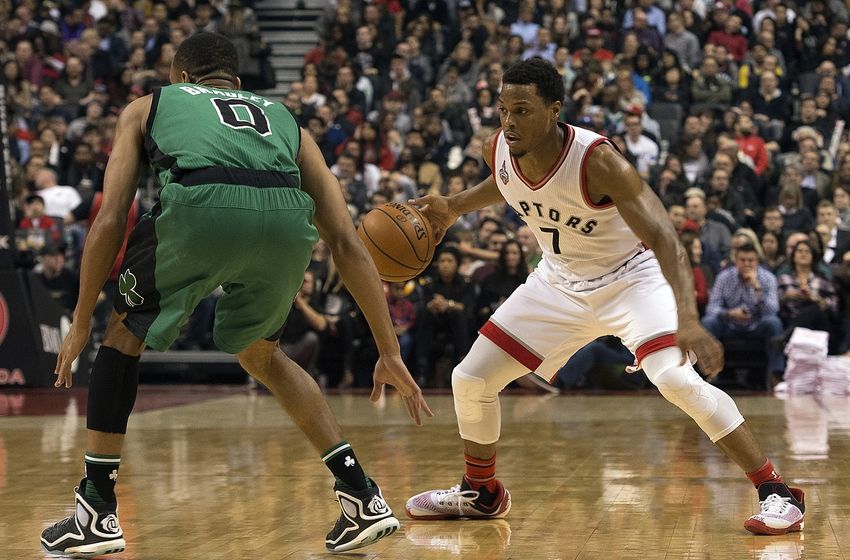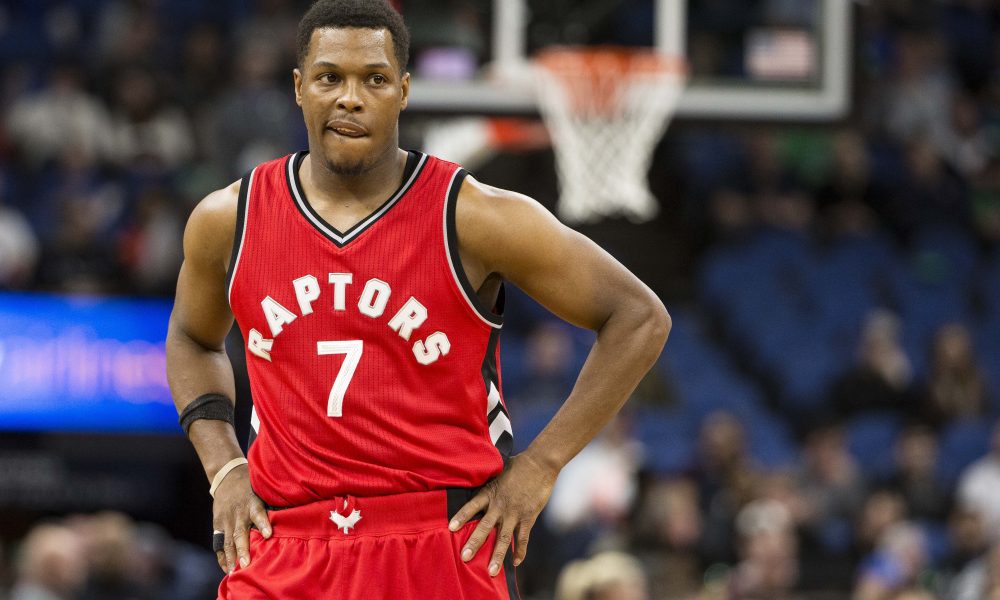It’s no great irony, just great coincidence, that the Raptors and the Celtics will face-off one day after this year’s trade deadline. These teams represent the greatest eastern conference threats to the Cleveland Cavaliers this season, and each knew that they’d need to scour the league for help if they wanted to seriously challenge LeBron and co. this spring.
However, despite their shared goals, their approaches to achieving them couldn’t have been more divergent, as evidenced by the fact that one team has been significantly boosted while the other looks exactly the same as the last time these two clubs met.
The big difference between the way that Masai Ujiri and Danny Ainge approached the deadline over the last week came down to this: Ujiri felt like he had to make a deal, while Ainge didn’t. Ujiri was overseeing a team backsliding into mediocrity, whereas Ainge’s Celtics were finally finding their footing after some rough early months this season. Ujiri had his star players openly pining for more help, while Ainge’s best player was content to tweet out hourglass emoji’s. At the end of the day, Ujiri acquired two major defensive assets, including Serge Ibaka, the team’s best power forward since Chris Bosh, while Ainge pursued Jimmy Butler and Paul George but refused to package enough assets to acquire either before 3pm.
The aftermath has most calling Toronto a trade deadline winner while Boston is pegged as a loser. The Raptors had a chance to upgrade at key spots and they did it, whereas the Celtics had the same chance and didn’t. Simple right? Well, not really. It will take months, maybe even years, to really suss out which decorated executive made the smarter choice yesterday.
Ujiri’s moves are pretty defensible. Ibaka addresses the team’s biggest need in a huge way. He’s a starting-caliber power forward, a three-time defensive player of the year, and he can space the floor for Toronto’s other stars. P.J. Tucker is not as impactful an acquisition, but his defensive tenacity is much-needed, and he provides depth on the wing. The cost for these two players was merely the ever-inconsistent Terrence Ross, a low first round pick, two second round picks, and Jared Sullinger. In other words, the Raptors lost nothing of much importance, asset-wise (I’ve always believed Ross was re-signed to be traded), and made huge improvements to their roster.
However, those aren’t the total costs of these trades, and Ujiri knows that. Ibaka and Tucker are free agents at the end of the season, along with Kyle Lowry and Patrick Patterson. If Ibaka works out as expected (or even at 80% of what’s expected), the Raptors will be required to make a hard push to re-sign him. Obviously the club is going to hand Lowry whatever he wants, and Patterson has proven somewhat indispensable, though we’ll see if they can ultimately afford his market value when the summer rolls around. Tucker is not the kind of player that the Raptors must re-sign, but if they don’t then they’ll have to find another wing to replace him.
All of that is to say that there is still a follow-on cost to these transactions in the form of real money (and cap-space) that has to be handed out in July, along with the anticipated costs of re-signing Lowry and (maybe) Patterson. That cost could push the Raptors into the luxury tax, rob them of future flexibility, and put a tremendous amount of pressure on the club to win as constructed. If the Raptors reach the conference finals and push the Cavaliers harder than they did last year, then those expenses are worth it. However, if the Raptors stumble in the second round, it could make a lot of people very uneasy about committing to this assemblage. It’s not like a second round exit would be a disaster, good teams that build for the long haul have seasons where that happens and no one panics, but the Raptors organization is new to being good, and we don’t yet know how the franchise or the fan base would react to such a scenario.
Ujiri is, of course, aware of this. It’s a reason he didn’t give up any of his young assets to grab Wilson Chandler from Denver. He’s got to measure the full extent of the backslide the team is still technically mired in, and he wants to keep his war chest as stocked as possible in case things don’t improve. It’s part of what was so commendable about yesterday’s trades, that he got two long-coveted players at a fraction of the transactional cost he’d have had to pay last summer. If things go really sideways the rest of the way, the Raptors didn’t mortgage the farm on these trades. If they work out, then you probably don’t mind investing in this group longer-term. Either way, the Raptors had chips to cash in, and they did that before new Lowry and Patterson contracts ravaged their flexibility this summer.
In fact, that probably stands as the greatest distinction between Toronto’s and Boston’s situations. Toronto was up against it in a few ways, with the deteriorating record and coming cap hit, whereas the Celtics are still in an incredibly flexible position for the next year or so. They have one of the lowest payrolls in the league thanks to Isaiah Thomas’ and Jae Crowder’s insanely affordable contracts, they are still sitting pretty with Nets draft picks in the next two drafts, and they have no major re-signings on the horizon for at least another year. Danny Ainge has been sitting on his trove of assets for years now, and it seems like he is content to continue to do that for at least another four months.
Ainge has always been a star-or-bust type of GM, or at least has been since the career-defining summer of 2007 when he acquired both Ray Allen and Kevin Garnett and won a title for the effort. Those moves have clearly had a profound effect on the way that Ainge manages assets. He wants stars, legit stars, in return for what he has to peddle. He got Al Horford to take his cap space last summer, and he got within spitting distance of Kevin Durant, too. Butler and George seemed attainable yesterday, but he feels like he can wait out the Bulls and the Pacers so that he can get one of those players and something else with one of Brooklyn’s coveted picks. The danger in that game, of course, is that you wait too long to cash in and there is nothing at the table worth cashing in for. This appears to be a scenario that Ainge is willing to accept, figuring that he can always find someone to take his cap space and that Brooklyn’s picks could just bring him talented players, but like Toronto, he is on a timetable that must align to the ages of Horford and Thomas, which limits somewhat the value of those prospective returns if they aren’t players on a similar trajectory.
It’s funny, in a way, that what really kept Ainge from making a splash is that he almost has too many coveted assets, which makes him gun shy about wasting any one of them. Ujiri wasn’t in such an enviable position. His assets were good, but not great, and arguably got a far better return than what he sent out (at least in terms of relative value to the Raptors franchise). It’s a lot easier to make moves when you feel you are getting more than you are giving, and it’s a lot harder for Ainge to feel that way when his assets are so good.
At the end of the day, though, this is about fielding the best teams you can and duking it out to see which one is better. Tonight, the Raptors come armed with a new look, while the Celtics remain as they were. Each has their own plan for conference domination: one is slow, gradual improvement, while the other is all about a couple of big scores. The goal remains the same for both, however, and each have to fend off the other to achieve it. That fight, coincidentally, is re-ignited tonight.



